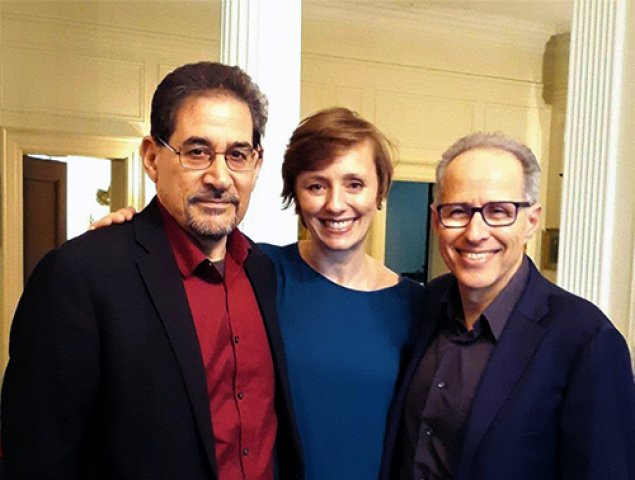John Musto Premiere from Copland House
Alexis PIa Gerlach and Michael Boriskin Perform
By: Susan Hall - Feb 23, 2021
Underscored
On the fourth Monday of every month, the Copland House brings us Underscored, zoomed performances from Aaron Copland’s study. Contemporary composers are featured. This must attend musical event is presented in collaboration with the Graduate Center of the City University of New York.
Founder and pianist Michael Boriskin introduced the premiere of John Musto’s Cello Sonata. Those familiar with the composer’s work will recognize his jazzy pizzicatos and legato melody lines in both piano and cello. The work is contrapuntal – a conversation and dialogue, with two two instruments talking to and against each other. They even go indifferent directions, but somehow find each other once again, The instruments also mirror each other – in groans from the bass for instance.
Asked about the ‘torino’ a Brazilian dance which Musto weaves into the third movement, the composer explains his process. Once he gets going with a work, what must follow each note and phrase comes to him. Perhaps because he allows this to happen, his work, as full as it is of change in color, rhythm and figures, feels a whole. This is his gift shining through.
Gerlach, a superb cellist, was amused and awed by the complexity of the work. You would consider it difficult as she plays with a brilliant clarity. Only an errant wave of hair brushes across her brow as she bows suggests effort. Her see-through, billowing sleeves of her blue blouse match the gold curtains of the room in their translucency. Gerlach speaks about sometimes playing the cello like a piano.
Reciprocally, Boriskin finds the piano sounding cello like, with long legato lines and linear color. Boriskin spoke about the exquisite minatures he found in the work, but this did not strike Musto.
Musto speaks interestingly about jazz being his foundation. It is where he dwells. As impeccably classical as his work is, the irregular rhythms and unexpected jumps hither and yon liberate the notes.
Musto composes well for the human voice, in song cycles and operas. He points out that text always drives music in those forms. Here notes stand for themselves, and he is a master of organized notes for listening pleasure.
Figures of varying lengths initiate the work and continue throughout. The variety of their lengths intrigues. The virtuosity is in the notes. There are no allusions. There is no scaffolding to support the notes. The lush sounds we hear talking more than suffice in Musto’s chamber composition.
Musto wants us to take a journey as we hear his music. We do. And a joyous one it is.
Underscored continues with John Harbison on March 22nd.

